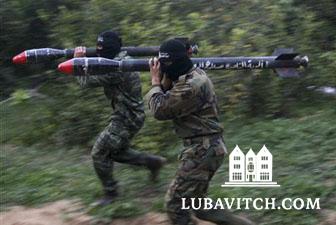(lubavitch.com) Israel’s air strikes on Gaza, aimed at bringing relief and restoring some kind of security to the country’s southern residents, have been greeted with an onslaught of more than 150 rocket attacks, chasing many residents out of their homes and cities, and confining the rest to bomb shelters. Chabad centers in Sderot, Ashkelon and Ashdod remain open despite city-wide lockdowns, providing support to residents and soldiers between sirens that give residents 15-20 seconds warning of incoming rocket.
But despite the chaos, there is a general sense of relief. “Until now people were angry and felt helpless,” said Rabbi Zev Pizem of Ashdod. “The war has made many happy that something is being done, even though things are now harder than ever before.”
Only three miles away from Gaza, Sderot has been under constant rocket attack for the past eight years. Residents have been frustrated with the lack of response and the constant fear that has become a feature of mundane life. At 11:30 am Saturday, in the middle of Sabbath prayers, congregants at Chabad of Sderot heard a series of explosions louder and more intense then the Qassam rockets common to the area.
“I was terrified, shocked that the rockets could get worse. It was so loud, so close,” said Leah Merzachanov, a resident of Sderot. “We went outside and saw the smoke over Gaza and knew it came from Israel.”
Rabbi Pizem estimates that close to half of the city’s residents have left to be with family or in government subsidized hotels. Sderot’s stores are closed, its streets, save for soldiers, are now deserted. Several hours after the surprise attack began, the army sent soldiers door to door distributing beepers for residents to signal for assistance and supplies.
But many families have yet to get a beeper, and countless bomb shelters across the city remain locked.
“The city is not prepared,” said Ms. Merzachanov. “I called the municipality and they are working on it, but I have nowhere to go if more missiles come.”
With missiles falling sometimes at 15 minute intervals, residents are homebound, tethered to the nearest bomb shelter. An elderly neighbor recently fell on the stairs and broke her leg in a frantic scramble to find shelter when the sirens went off, Ms. Merzachanov told Lubavitch.com.
“We’re taking calls, helping people one by one, said Rabbi Pizem, who adds that Chabad is also there for the soldiers.
As early as Wednesday of last week, mortar attacks on Ashkelon intensified, contributing to Israel’s decision to launch its defensive air strikes, says Rabbi Menachem Liberman, Director of Chabad of Ashkelon.
“The town is empty, everything is closed and people are afraid to leave their homes,” he says. “We’re staying open, shifting our school into various shelters across the city. We need to do this to keep the morale up.”
Besides keeping their school open, Chabad of Ashkelon kept its scheduled Sunday night Chanukah party at the local hospital’s children’s ward. With menorahs and presents to go around, the staff and children were wowed that the event was not cancelled. Also participating in the festivities were two Arab children from Gaza who were injured during the air strikes and receiving treatment in Ashkelon.
“We got all of our teachers to reach out and call their students. The sirens and explosions are terrifying and traumatizing the children. Many are crying or suffering with fears, bedwetting and stuttering.”
To reach towns further away like Ashkelon and Ashdod, terrorists use Grad rockets, five times more powerful than the Qassam rockets launched at Sderot. “When the sirens go off we run to get behind or under two layers of concrete,” explains Rabbi Liberman. “The first detonates the 25 kilo warhead and the second stops the rocket.
Things are quiet in Ashdod after several sirens and missiles on Saturday and Sunday. The increased capacity of the terrorist’s rockets has put this major port city under greater threat then ever before. The city represents a significant target, home to strategic points like a Navy base, the country’s largest oil refineries, high security aircraft industry, and electric plants.
“Months ago a rocket hit the sand dunes near the Chabad House, but we never had an intense threat like this before,” said Rabbi Schneur Goodman of Ashdod. “There’s no panic, but fear and sense of just waiting for something to happen.”
Two more temporary fire stations were opened and there is a regular stream of machinery and equipment moving into the city. Rabbi Goodman said parents are calling constantly about school and he is planning to open on Tuesday with the end of the Chanukah holiday.
“We heard the roar of planes on Shabbat morning and knew something was going on,” said Rabbi Goodman. “Then the sirens started around 2:30 in the afternoon and it’s been a waiting game ever since.”
For many southern residents, the operation in Gaza represents the light at the end of the tunnel and hope for a more secure future without constant fear. But until it is over, life is lived between the air raids and within the four walls of concrete bomb shelters.
“I’m used to it after so many years and seeing thousands traumatized,” said Ms. Merzachanov. “I am happy they are finally doing something. We were beginning to feel like we weren’t part of Israel. It is high time. The children can’t take it anymore.”
For the first time in eight years of bombardment, Ms. Merzachanov said she was fearful of the situation and was evacuating her home. She received a special military escort to Rabbi Pizem’s home to be with his family in their shelter.

Be the first to write a comment.